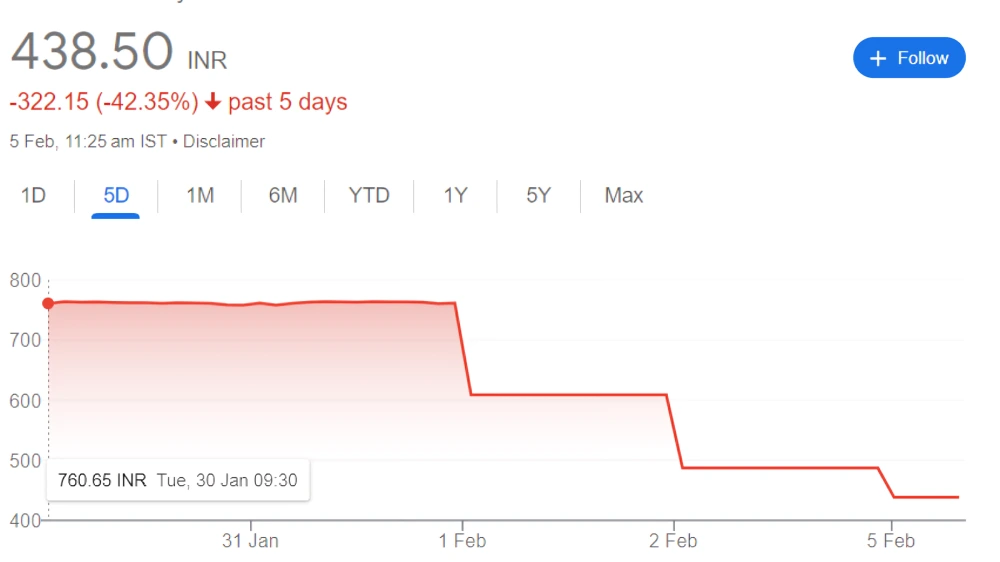Paytm Shares Nears Record Low
The Indian digital payments company Paytm (One 97 Communications Ltd) has experienced a dramatic decline in recent times, with its shares falling by around 10% to almost all-time lows. The market was shaken by this loss, which came after a slew of regulatory measures against its banking division.
Last week, the Reserve Bank of India (RBI) delivered Paytm Payments Bank a serious blow by directing it to stop taking new deposits into its popular wallets and accounts as of March 1. As a result, Paytm’s market value has dropped precipitously by about $2.5 billion, or an astonishing 43%.
Paytm Shares are falling
The RBI‘s order has had an immediate and drastic effect, sending Paytm’s shares plunging. The stock closed on Monday at 438.5 rupees ($5.28), barely below the previous all-time low set in November 2022. Paytm’s shares fell 20% on Thursday and Friday as a result of the regulatory crackdown, which was the daily maximum decrease.

Paytm is purportedly looking into selling its wallet business, which is operated by Paytm Payments Bank, in the middle of the upheaval. There have been discussions with Jio Financial Services and HDFC Bank, albeit no formal remarks have been made by any of the parties.
But the RBI’s order is just one aspect of the regulatory scrutiny Paytm Payments Bank is subject to. There may have been money laundering going on because the RBI reportedly found many bank accounts without the required documentation. For more inquiry, the data has been sent to India’s financial crime-fighting organization.
In reaction to these accusations, Paytm has sharply rejected any role in money laundering and stressed that the Enforcement Directorate has not looked into either the business or Paytm Payments Bank. But things are still tight since government regulators are keeping a closer eye on the business’s operations.
India’s stock exchanges have limited Paytm’s daily trading limit, which was previously 20% and is now 10% as a result of the present unrest. The purpose of this action is to lessen the market’s exposure to the stock’s volatility.
Paytm’s recent developments should serve as a lesson for digital payment companies that operate in India’s quickly changing regulatory environment. Companies such as Paytm are subject to increased regulatory scrutiny and obstacles as authorities step up their attempts to curtail potential financial irregularities.
With an eye toward determining the long-term effects on Paytm and the larger digital payments ecosystem in India, investors and industry players are keeping a careful eye on the situation. In the midst of uncertainty, one thing is certain: India’s digital economy’s future course will continue to be shaped by the regulatory environment.
Open Demat Account on MStock With Zero Brokerage
You may also Read our Finance, World News, Local News, Health, Food, and Education articles.


